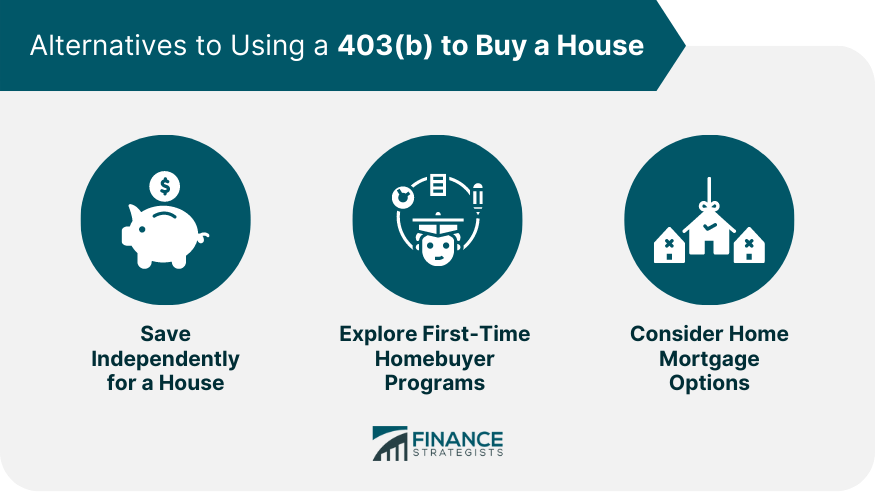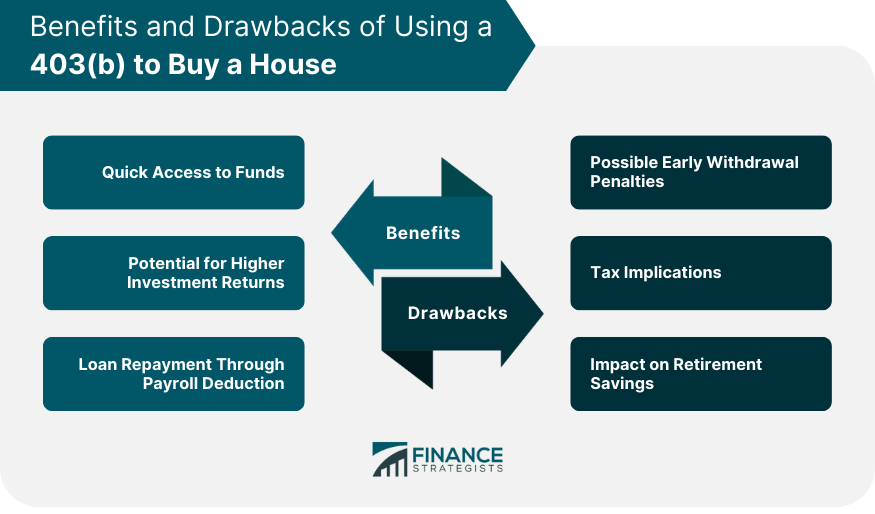Yes, you can use your 403(b) to buy a house, but it's generally not recommended due to potential tax implications and impact on your retirement savings. There are two ways you might access your 403(b) funds for home purchase: loans and hardship withdrawals. If your plan permits loans, you may borrow up to 50% of your vested account balance but no more than $50,000, and it must typically be repaid within five years. A hardship withdrawal could be another option, but it is subjected to income taxes and possibly a 10% early withdrawal penalty if you're under 59½ years old. Both options could significantly deplete your retirement savings and should be considered carefully. You should consult a financial advisor to evaluate your situation and consider all possible options before making this decision. The most straightforward alternative is to save money in a separate account designed for your house down payment. While it may take longer, this method doesn't impact your retirement savings. There are several first-time homebuyer programs, both at the national and local levels, that offer incentives such as down payment assistance and competitive mortgage rates. Traditional home mortgages, FHA loans, or VA loans are all possibilities that could finance your home purchase without dipping into your retirement savings. Each has its own set of criteria and benefits, and the best option depends on your individual circumstances. Using funds from a 403(b) plan can provide quick access to money for a down payment, especially if you haven't had time to save enough for this purpose. Investing in real estate can potentially provide higher returns than the average return on a 403(b) plan, particularly in areas where home prices are increasing rapidly. If your plan allows loans and you borrow from your 403(b) to buy a house, repayments are made through payroll deductions, which can be more manageable. As previously mentioned, withdrawing funds before age 59½ can lead to a 10% early withdrawal penalty, although this penalty may be waived for certain hardship withdrawals. Withdrawals from a 403(b) are taxed as ordinary income. Even if you avoid the early withdrawal penalty, you'll still need to pay income tax on the amount withdrawn. By withdrawing from your 403(b) to buy a house, you could significantly impact your retirement savings. Not only are you removing funds that would otherwise grow tax-free, but you could also miss out on employer matching contributions. Before deciding to use your 403(b) to buy a house, you should have a clear understanding of your overall financial situation and retirement goals. Calculate how this withdrawal or loan might impact your retirement savings in the long run. This decision involves complex tax implications and potential penalties. A financial advisor or a tax professional can provide personalized advice based on your unique situation. You should consider the cost of borrowing or withdrawing from your 403(b), including the potential loss of compounded growth on your investments, potential penalties, and tax implications. Weigh these costs against the benefits of homeownership, such as potential appreciation and tax benefits. The IRS has strict guidelines defining what constitutes a hardship. You must be able to prove that the hardship is immediate and heavy and that you have no other resources to meet the need. ERISA is a federal law that sets standards for most voluntarily established retirement plans to provide protection for individuals. One of the things it mandates is that plan participants receive detailed information about their plan. State laws can also impact your decision. Some states offer more protections than others for retirement accounts in terms of bankruptcy and creditor protections. Moreover, local real estate laws and tax codes can affect the cost-effectiveness of purchasing a home. Utilizing a 403(b) to buy a house is an option, but it should be exercised with caution due to the potential tax implications, early withdrawal penalties, and the impact on your retirement savings. While it can provide quick access to funds and the potential for higher returns, the drawbacks could be significant. Alternatives such as independent savings, first-time homebuyer programs, or other mortgage options should be considered. It's vital to understand your financial situation and retirement goals, consult a financial advisor, and evaluate all costs and benefits. Familiarity with IRS regulations, the Employee Retirement Income Security Act (ERISA), and state laws governing retirement funds and real estate transactions is also crucial. The decision requires comprehensive financial planning and an in-depth understanding of the potential impact on your future security.Can I Use My 403(b) To Buy a House?
Alternatives to Using a 403(b) to Buy a House
Saving Independently for a House
Exploring First-Time Homebuyer Programs
Considerations for Home Mortgage Options

Benefits of Using a 403(b) to Buy a House
Quick Access to Funds
Potential for Higher Investment Returns
Loan Repayment Through Payroll Deduction
Drawbacks of Using a 403(b) to Buy a House
Possible Early Withdrawal Penalties
Tax Implications
Impact on Retirement Savings

Strategies to Effectively Utilize a 403(b) for Home Purchase
Understand Financial Situation and Retirement Goals
Consult With a Financial Advisor
Evaluate the Cost and Benefits
Legal Implications and Considerations When Using a 403(b) to Buy a House
IRS Regulations on Hardship Withdrawals
Employee Retirement Income Security Act (ERISA)
State Laws on Retirement Funds and Real Estate Transactions
Conclusion
Can I Use My 403(b) To Buy a House? FAQs
Yes, you can use your 403(b) to buy a house, either through a loan or a hardship withdrawal, if your plan allows it. Potential benefits include quick access to funds, possible higher investment returns, and manageable loan repayments made through payroll deductions.
If you use your 403(b) to buy a house, you may face early withdrawal penalties, tax implications, and a significant impact on your retirement savings. It's important to evaluate these drawbacks before making a decision.
Yes, there are alternatives such as saving independently for a house, exploring first-time homebuyer programs, or considering other mortgage options. These options can help you finance your home purchase without impacting your retirement savings.
If you decide to use your 403(b) to buy a house, it's crucial to understand IRS regulations on hardship withdrawals, the Employee Retirement Income Security Act (ERISA), and the impact of state laws on retirement funds and real estate transactions.
Before deciding to use your 403(b) to buy a house, understand your financial situation and retirement goals, consult with a financial advisor, and evaluate the cost and benefits. It's also essential to understand the rules of your 403(b) plan and the legal and tax implications of your decision.
True Tamplin is a published author, public speaker, CEO of UpDigital, and founder of Finance Strategists.
True is a Certified Educator in Personal Finance (CEPF®), author of The Handy Financial Ratios Guide, a member of the Society for Advancing Business Editing and Writing, contributes to his financial education site, Finance Strategists, and has spoken to various financial communities such as the CFA Institute, as well as university students like his Alma mater, Biola University, where he received a bachelor of science in business and data analytics.
To learn more about True, visit his personal website or view his author profiles on Amazon, Nasdaq and Forbes.















